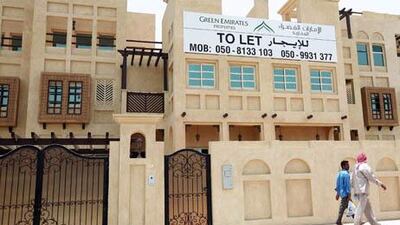Abu Dhabi rents fell by as much as 16 per cent in the last three months of last year as more finished homes hit the market.
The steep drop from the previous quarter contrasts with Dubai, where the pace of decline appears to be slowing, brokers say.
Average rents for apartments in Dubai slipped 3.3 per cent, and rents for villas slipped 3.2 per cent in the last quarter compared with the previous quarter, according to research released yesterday by the property consultant Cluttons.
Analysts expect rents in Abu Dhabi to continue to drop as new projects open on Reem Island and the Corniche. More than 5,000 apartments are due to be handed over in the next six months.
"The sheer volume of stock coming on the market at the same time is bound to have an impact," said Paul Maisfield, the general manager of the Abu Dhabi office of Asteco, a property firm.
New data suggest two distinct rental markets are emerging in the capital.
The high end of the market, primarily areas in northern Abu Dhabi, dropped 8 per cent in the fourth quarter, according to Cluttons. But the lower sector of the market with older buildings experienced drops of up to 16 per cent in the quarter.
Asteco's latest research, also released yesterday, shows similar drops, although not as dramatic. Overall, apartment rental rates in Abu Dhabi fell 7 per cent in the quarter compared with the previous quarter, with villa prices down 5 per cent, Asteco said. Rents for off-island developments were down 15 per cent in the quarter, Asteco found.
In the past year, apartment prices in some parts of Abu Dhabi have fallen between 16 and 30 per cent compared with the same period the year before, depending on the neighbourhood, Asteco reported.
Abu Dhabi prices are being affected by Dubai, where rents are typically 25 per cent to 30 per cent lower than in the capital, analysts say.
"You can't have two cities 100 miles apart and one with low rents and not have it affect the other city," said Steve Morgan, the head of Cluttons in the UAE. "We've only seen the real effect over the last six months."
Rental prices in Abu Dhabi have now fallen for four consecutive quarters, Cluttons reported.
In addition to the arrival of new buildings, a decline in company housing allowances and increased flexibility among landlords is spurring the decline in prices. Many tenants are looking to upgrade, which will further pressure owners of older buildings to reduce rents, analysts say.
"Some [landlords] are willing to negotiate and some are taking a hard line," Mr Morgan said. "Those taking a hard line have high vacancy rates."
The exception is high-end buildings and villas on the Corniche, Khalidiya and Al Bateen, which continue to command top rents, Mr Maisfield said.
"There are great-quality buildings in these area," he said. "They always maintain good rental levels."
New developments such as Golf Gardens and Al Raha Gardens, which offer tennis courts, gymnasiums and pools, are also drawing tenants and top rents, industry executives say.
Tenants are "paying Dh10,000 [US$2,722] to Dh15,000 extra because they are getting better facilities", said Ahmed Nawab, the chief executive of Trust City Real Estate.
But the gap is growing between the high end and the low end, the data show. One-bedroom apartments in older areas of the city are typically priced at Dh50,000 a year, while one-bedroom apartments in upper-end neighbourhoods attract an average of Dh110,000, Cluttons reported.
But it can still be difficult for prospective tenants to find a good deal. Amanda Tavares, 25, an engineer from Brazil, has been looking for a one-bedroom apartment in Abu Dhabi for the past two weeks.
"I haven't found much so far," said Ms Tavares, who did not want to pay more than about Dh85,000 a year. "There is not much available in the city."
The decline in rents is also hitting sales in off-island developments, yesterday's data show. In Al Reef, prices are down 12 per cent from the third quarter last year, Cluttons reports; Asteco says Al Reef prices are down by as much as 27 per cent in the same period.

